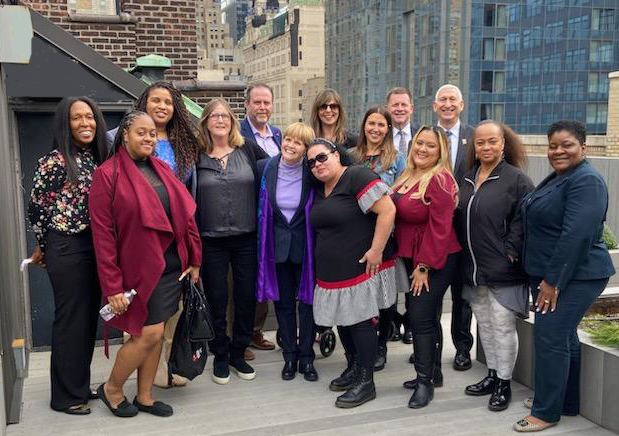In New York State, more than 1.4 million people are struggling with both severe mental health issues and substance use disorders. Too often, these challenges are treated separately, creating barriers that make it difficult for those in need to access the right care.
Change is on the horizon: Stony Brook University’s School of Social Welfare (SSW) and Samaritan Daytop Village have developed a creative solution to address these dual crises while simultaneously building a workforce equipped to meet the complex demands of New Yorkers in need.
“The need to fortify and expand the addiction workforce has never been greater,” said Melissa Earle, clinical associate professor and director of Addictions and Online Education for the SSW, who worked with Samaritan Daytop Village Vice President of Residential Programs and Recovery Services, Jim Hollywood, to create the SOLAR program. “We are very grateful to Samaritan Daytop Village for creatively collaborating with us to create this innovative educational pathway.”
 With funding from the New York Community Trust, the Social Work Opportunities for Leadership in Addiction and Recovery (SOLAR) program allows frontline workers from Samaritan’s residential programs, transitional housing, and outpatient settings to pursue a Master of Social Work (MSW) degree at Stony Brook, free of charge — while continuing to work full-time. This pathway provides a hybrid schedule of online courses, specialized mentorship and internships that aligns with their existing roles. As a result, Samaritan’s workers are gaining the expertise to address both mental health and addiction, expanding their skills to serve clients more effectively, and making it easier for clients to access the care they so desperately need.
With funding from the New York Community Trust, the Social Work Opportunities for Leadership in Addiction and Recovery (SOLAR) program allows frontline workers from Samaritan’s residential programs, transitional housing, and outpatient settings to pursue a Master of Social Work (MSW) degree at Stony Brook, free of charge — while continuing to work full-time. This pathway provides a hybrid schedule of online courses, specialized mentorship and internships that aligns with their existing roles. As a result, Samaritan’s workers are gaining the expertise to address both mental health and addiction, expanding their skills to serve clients more effectively, and making it easier for clients to access the care they so desperately need.
So far, 10 Samaritan Daytop Village team members have enrolled; one has already graduated, and the rest are set to graduate this spring. This initiative strengthens the community by ensuring that the workforce is prepared to tackle the addiction and mental health crises head-on.
As the state considers how to allocate $26 billion in opioid settlement funds, programs like this offer a model for how workforce education can make a difference, with Stony Brook and Samaritan leading the way.
— Beth Squire

